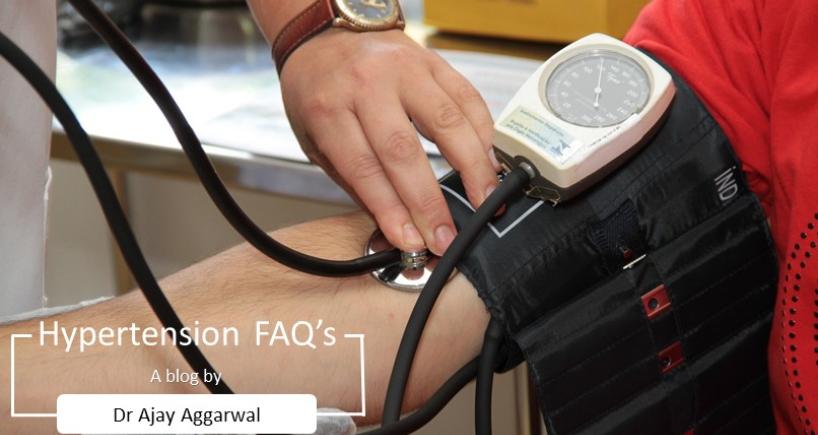
Diabetology/Endocrinology
Hypertension Faq’S
Dr. Ajay Aggarwal May 22, 2020

The magnitude of the problem:
High blood pressure, also known as hypertension, is a global health problem. 10 million deaths occurred in 2015 due to hypertension, 4.9 million deaths were related to ischemic heart disease, 2.0 million were related to Hemorrhagic stroke & 1.5 million were related to ischemic stroke. High blood pressure is also responsible for 50% of heart disease, stroke, and heart failure related deaths. ~13% of the overall deaths in a population are a result of Hypertension. In case the patient is suffering from diabetes, ~40% of deaths are caused due to Hypertension. Hypertension also causes kidney failure, dementia, maternal and fetal death in pregnancy.Approximately, every 4 out of 10 adults have hypertension and 9 out of 10 individuals living up to 80 years of age will develop hypertension. Ironically, about half of the blood pressure-related diseases occur in people, with a high normal range of blood pressure. The majority (66%) of the hypertension patients are found in the emerging economies and around 25% of the health care cost is directly related to hypertension.
How to detect hypertension?
As per the recent European Society (2018) of Cardiology (ECS) and the European Society of Hypertension (ESH) guidelines, the optimal blood pressure is less than 120/80 mm Hg. Normal blood pressure is 120-129/80-84 mm Hg. High normal BP: 130-139/85-89 mm Hg. Grade I hypertension: 140-159/90-99 mm Hg. Grade 2 hypertension: 160-179/100-109 mm hg. Grade 3 hypertension > 180/110 mm Hg. Isolated systolic hypertension >140/89 mm Hg or less diastolic blood pressure.What are the causes?
The majority of the causes for Hypertension are related to an unhealthy lifestyle. About 30% of hypertensive patients are related to increased salt consumption and 20% are related to low potassium (fruit & vegetables) intake. Physical inactivity is related to another 20% patients. Obesity is related to another 30% of hypertensive patients. Excessive alcohol is also an important cause of hypertension in many people. Tobacco (Both smoking & non-smoker forms) is another contributor. Altered sleep cycle, short sleep span, poor quality of sleep, anxiety, depression also contributes to hypertension in many people. The presence of a family history of hypertension in either parents or first-degree relatives, diabetes mellitus and high cholesterol are found to be related to the occurrence of hypertension in patients.The crux of the problem:
The main issue in the control of hypertension is that most people are unaware of high blood pressure and hence this disease is also known as the Silent Killer. Even after detection, half of the patients remain untreated and majority of the rest half are inadequately treated to reach the desired target.Associated medical conditions:
Most people with hypertension have an additional disease like heart disease, high blood sugars, high cholesterol, kidney dysfunction. A complete assessment by health care professionals is required for therapy initiation.How to control hypertension:
Hypertension is treated by (1) non-drug therapies through lifestyle related changes and (2) drug therapy. Stage I hypertension in the absence of organ involvement can be treated by non-drug therapy alone, after consultation with a qualified healthcare professional. Organ involvement at any stage dictates drug therapy. Various classes of efficacious drugs are available.Prevention:
Benjamin Fraklin once said, "An ounce of prevention is better than a pound of cure". The same principle applies for Hypertension patients as well. Since this is a lifestyle-related disorder, changing lifestyle controls high blood pressure. Choose unprocessed or minimally processed foods. Low sodium options should be given preference. Do not add extra salt to food. Restrict salt consumption to 5gm (1 teaspoon) per day. Be physically active. At least 40-45 minutes of isotonic exercise like a brisk walk, jogging, cycling, swimming is important. Isometric exercise like heavy weight lifting should be avoided. Yoga has additional health benefits and should be a part of hypertension management. Attain a healthy body weight. Ideal body mass index (weight in Kg divided height in square meter).Tobacco consumption should be avoided. Both smoking or non-smoking forms of tobacco consumption are related to health risks. Alcohol consumption has to be moderated. Contrary to popular belief, alcohol consumption does not protect Indians from vascular events. Some studies and data show that it increases the risk of stroke and heart attack, marginally. Sleep 7 hours a day. Good quality of 7 hours of sleep reduces the risk of stroke and vascular events. Listening to Indian classical music is associated with a lower level of blood pressure.
Finally, we all should advocate for a healthy public policies like space for exercise, cycling path, availability of BP measurement, cheaper drugs, mandatory mention of salt, trans fat, cholesterol in the packaged food items, tobacco ban, smoke-free environment, etc.
Categories
Clear allMeet the doctor

Dr. Ajay Aggarwal
DIRECTOR ENDOCRINOLOGY | Fortis Shalimar Bagh
- Diabetology/Endocrinology | Endocrinology
-
17 Years
-
1200


















